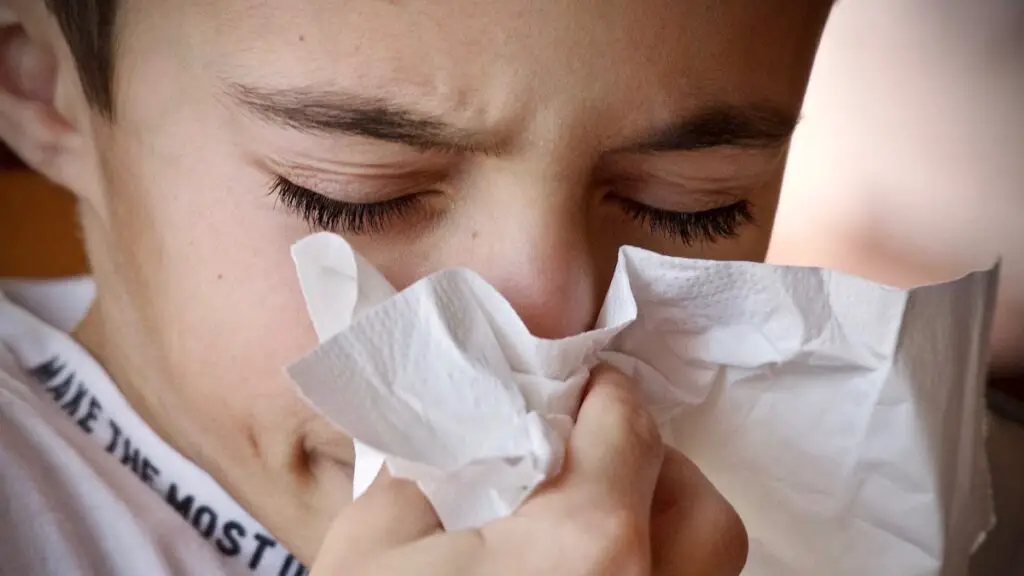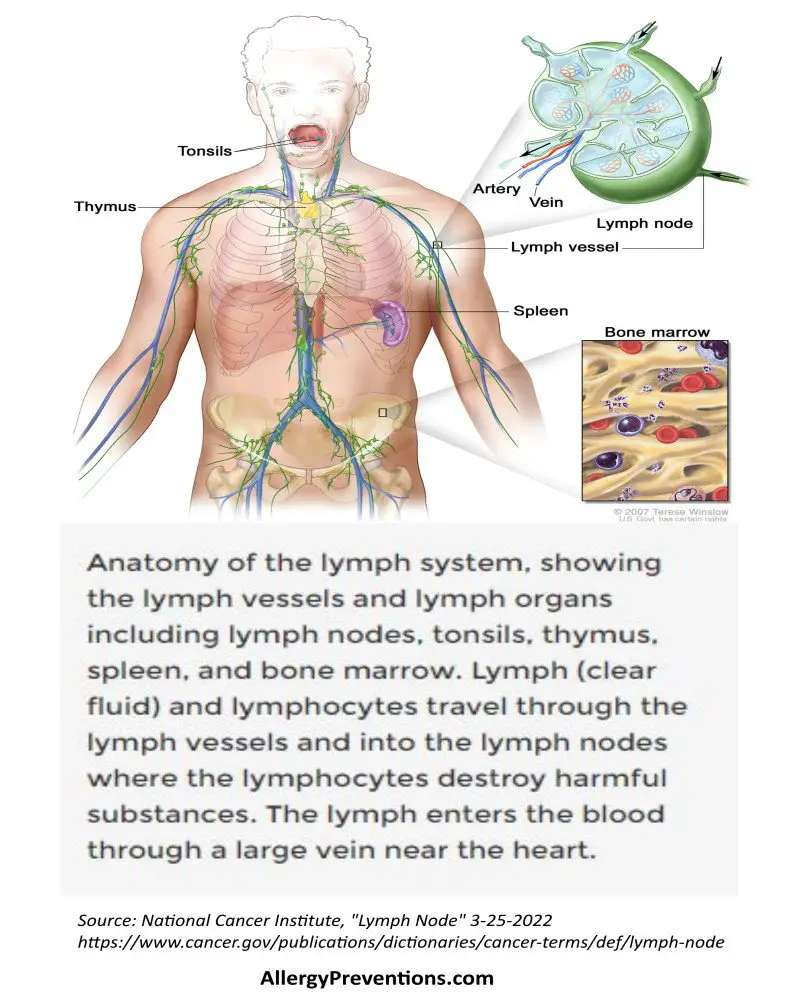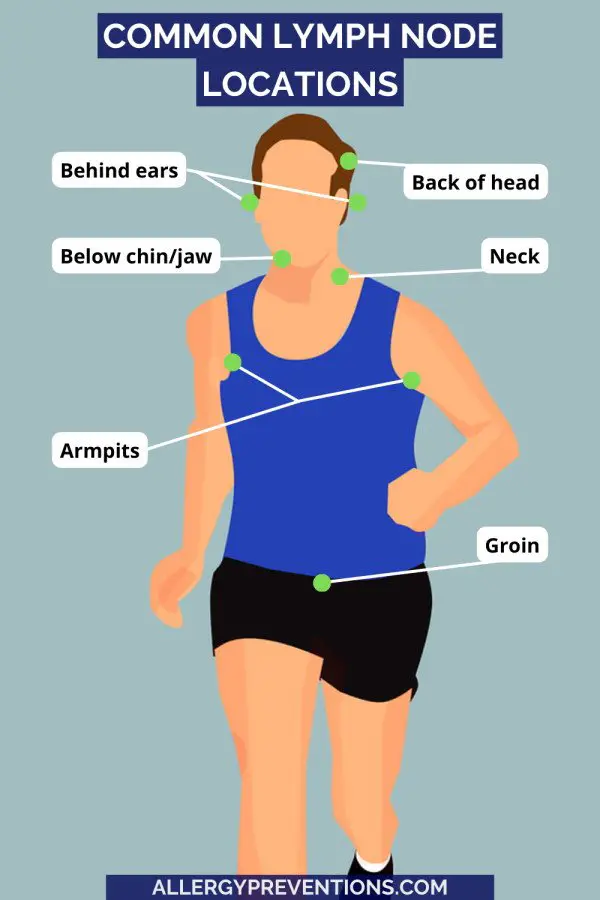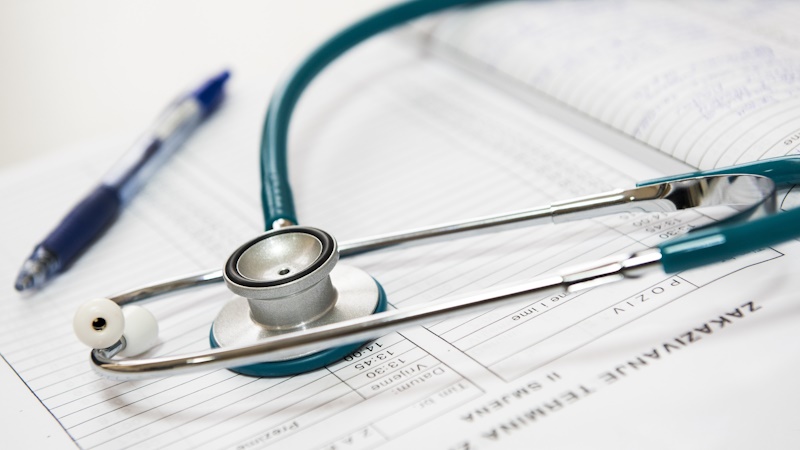Can allergies cause swollen lymph nodes? Yes, allergies may indirectly cause swollen lymph nodes. When you have allergies, your immune system is constantly working and may become overworked. An overworked immune system can cause you to get sick, thus causing swollen glands. You experience swollen lymph nodes when you have an infection. Lymph nodes have white blood cells that help fight against the infection in your body.

Table of Contents
Can allergies cause swollen lymph nodes?

Yes, allergies could cause swollen lymph nodes. While allergies themselves don’t directly cause swollen lymph nodes, they can trigger the body’s immune response, leading to lymph node enlargement as a secondary reaction.
When allergens such as pollen, dust, or certain foods enter the body, the immune system may perceive them as harmful invaders and initiate a defensive response. This response can include the activation of immune cells in the lymph nodes, causing them to swell as they work to filter out the allergens and mount a defense.
Swollen lymph nodes are often a sign that the immune system is actively responding to an allergen.
However, if the swelling persists or is accompanied by other symptoms like fever or pain, it’s important to consult a healthcare professional to rule out other underlying causes and determine the appropriate course of action.
Lymph Node Allergic Reaction Process
An allergic reaction involving the lymph nodes occurs when the immune system responds to an allergen, triggering inflammation and enlargement of the lymph nodes. This reaction is part of the body’s defense mechanism, as the lymphatic system works to filter and eliminate foreign substances. Here’s an overview of the lymph node allergic reaction process.
You Have an Allergen Exposure

The process begins when an individual is exposed to an allergen, which is a substance that the immune system perceives as harmful, even though it may not be. Common allergens include pollen, dust mites, pet dander, certain foods, insect venom, or medications.
Your Immune Response
Upon exposure, the immune system, particularly the lymphocytes (a type of white blood cell) and antibodies, reacts to neutralize the perceived threat. Immunoglobulin E (IgE) antibodies are often involved in allergic reactions.
Histamine Chemicals are Released
In response to the allergen, the immune cells release various chemicals, including histamines. Histamines play a key role in the inflammatory response and can lead to the dilation of blood vessels and increased permeability.
Lymph Nodes Become Inflamed
Lymph nodes, which are small, bean-shaped structures distributed throughout the body, contain immune cells. When an allergic reaction occurs, these cells become activated, leading to inflammation and enlargement of the lymph nodes. This is the body’s way of filtering and processing the allergen.
Swelling and Tenderness Occurs
The affected lymph nodes become swollen and may be tender to the touch. The swelling is a result of an increased number of immune cells and fluid accumulation within the nodes.
Regional Response Reaction
The location of the swollen lymph nodes often corresponds to the region where the allergen entered the body. For example, exposure through the respiratory system may cause swollen lymph nodes in the neck or throat.
Accompanying Symptoms Surface
In addition to swollen lymph nodes, individuals may experience other allergic symptoms, such as itching, sneezing, runny nose, watery eyes, hives, or difficulty breathing, depending on the type of allergen and the individual’s sensitivity.
Resolution Process Begins
In many cases, the allergic reaction resolves once the allergen is removed or the immune response diminishes. Antihistamines and other allergy medications can help alleviate symptoms and reduce the size of swollen lymph nodes.
It’s important to consult with a healthcare professional if allergic reactions, including swollen lymph nodes, are persistent, or severe, or if there are concerns about the underlying cause. In some cases, allergies may require medical intervention to manage symptoms effectively.
Symptoms of Swollen Lymph Nodes

Swollen lymph nodes, also known as lymphadenopathy, can occur in response to various underlying causes, such as infections, autoimmune disorders, or cancers. Here are common symptoms associated with swollen lymph nodes:
- Palpable Swelling: This is often felt in areas where lymph nodes are concentrated, such as the neck, armpits, and groin.
- Tenderness or Pain: Swollen lymph nodes can be tender or painful to the touch. The level of discomfort can vary from mild to more pronounced.
- Enlargement: Lymph nodes can increase in size, ranging from a small pea to a larger, more noticeable swelling, depending on the cause and severity.
- Warmth and Redness: The skin over the swollen lymph nodes may appear warm or slightly reddened.
- Mobility Lessens: Normally, lymph nodes are mobile and can move slightly under the skin when touched. In some cases, they might feel fixed or immobile.
- General Malaise: Individuals with swollen lymph nodes may experience a general feeling of being unwell, including fatigue, weakness, or lethargy.
- Fever: Depending on the underlying cause, fever may accompany swollen lymph nodes as the body’s immune system responds to an infection.
- Localized Symptoms: Swollen lymph nodes often occur in response to specific localized issues. For example, swollen nodes in the neck might be associated with a throat or respiratory infection.
- Skin Infections: In cases where swollen lymph nodes result from skin infections, symptoms such as redness, warmth, and pus formation in the affected area may be present.
- Sore Throat: Swollen lymph nodes in the neck are commonly associated with throat infections, leading to symptoms like a sore throat.
- Joint Pain: Swollen lymph nodes due to certain infections or inflammatory conditions may be accompanied by joint pain.
It’s important to note that while swollen lymph nodes are often a sign that the immune system is responding to an issue, they don’t always indicate a serious condition.
However, persistent or unexplained swelling, especially if accompanied by concerning symptoms, should be evaluated by a healthcare professional for a proper diagnosis and appropriate treatment.
What helps swollen lymph nodes from allergies?

Managing swollen lymph nodes due to allergies involves addressing the underlying allergic reaction and alleviating symptoms. Here are some strategies to help swollen lymph nodes caused by allergies:
- Allergy Medications: These medications help reduce histamine levels, which can alleviate allergy symptoms and, consequently, reduce swollen lymph nodes.
- Avoid Allergens: Identifying and avoiding allergens that trigger the immune response is crucial. This might include pollen, animal dander, dust mites, or certain foods.
- Cold Compresses: Applying a cold compress to the affected area can help reduce inflammation and provide relief.
- Decongestants: For allergies affecting the nasal passages, decongestants can help relieve congestion and reduce lymph node swelling.
- Elevate the Head: Elevating the head during sleep can help minimize nasal congestion and promote lymphatic drainage.
- Hydration: Staying well-hydrated is important, as it can help flush out toxins and support the overall function of the lymphatic system.
- Maintain Good Hygiene: Practicing good hygiene, such as regular handwashing and keeping the affected area clean, can prevent secondary infections and support recovery.
- Nasal Rinses: Nasal saline rinses can help clear irritants from the nasal passages, reducing the burden on the lymphatic system.
- Over-the-Counter Pain Relievers: Non-prescription pain relievers, such as acetaminophen or ibuprofen, can help alleviate pain and discomfort associated with swollen lymph nodes.
- Rest: Getting adequate rest allows the body to recover and supports the immune system in managing allergic reactions.
- Warm Salt Gargle: For allergies affecting the throat, a warm saltwater gargle can help soothe irritation and reduce swelling.
It’s essential to note that if swollen lymph nodes persist, worsen, or are accompanied by severe symptoms, it’s advisable to consult with a healthcare professional. They can provide a more accurate diagnosis, recommend specific treatments, and rule out other potential underlying causes.
Other Causes of Swollen Lymph Nodes
The cause of swollen lymph nodes (also known as lymph glands), is typically when your body is fighting an infection. The NHS explains that swollen glands are usually caused by one of the following:
- Cancer
- Colds (rhinovirus)
- Ear infections
- Glandular Fever
- Leukemia
- Lymphoma
- Throat infections
- Tonsillitis
- Viral Infections
How to Treat Swollen Lymph Nodes

The treatment for swollen lymph nodes (lymphadenopathy) is usually home care to ease symptoms. Here is some information on how to treat swollen glands:
- Do Not: Pop, push, or squeeze lymph nodes
- Do Not: Stick a needle into the lump
- Do: Get plenty of rest
- Do: Drink lots of fluids to stay hydrated
- Do: Consider taking over-the-counter pain medicine
- Do: Apply a warm compress to ease the pain
What are lymph nodes?

Lymph nodes are nodes that look like little lima beans. Lymph nodes are essentially filters that capture infection or disease to keep you healthy.
The National Cancer Institute defines a lymph node as:
“A small bean-shaped structure that is part of the body’s immune system. Lymph nodes filter substances that travel through the lymphatic fluid, and they contain lymphocytes (white blood cells) that help the body fight infection and disease.
There are hundreds of lymph nodes found throughout the body. They are connected to one another by lymph vessels. Clusters of lymph nodes are found in the neck, axilla (underarm), chest, abdomen, and groin. For example, there are about 20-40 lymph nodes in the axilla. Also called lymph gland.”
Lymph Nodes Location in the Body

Lymph nodes are found throughout the body, here is a list of the common locations to find lymph nodes:
- Armpits
- Back of the head
- Behind the ears
- Below chin
- Groin
- Neck
- Under jaw
Why do lymph nodes swell?
Lymph nodes begin to work when there is an infection, injury, or cancer to handle. As these “filters” are working to get rid of the infected cells, they begin to swell as they take on more fluid and/or waste to be purged.
For example, if the lymph nodes in your neck or jaw are swelling, this may be a sign of a cold. There are some instances when many areas of lymph nodes swell. The cause of multiple lymph node swelling is certain infections, some medications, autoimmune diseases, and cancers.
A point to drive home is that lymph node swelling is rarely caused by cancer.
When to see a Doctor For Enlarged Lymph Nodes

According to leukaemiacare.org.uk, you should see your doctor if your swollen lymph nodes:
- Are enlarged but painless
- Are enlarged when you have no signs of illness
- Are still swollen after 2-weeks
- Cannot be moved around or are stone-like
- Continue to grow in size
- Do not get better with antibiotics
It is always recommended to talk with your healthcare team for a diagnosis and treatment options.
Swollen Lymph Nodes FAQs
Here are the most common questions asked about lymph nodes and allergies.
Can seasonal or environmental allergies cause swollen lymph nodes?
Yes. Allergies can cause lymph nodes to swell (very rare). Typically the swelling is caused by illness or inflammation.
Can antihistamines help with swollen lymph nodes?
Probably not. Swollen lymph nodes are mainly caused by an illness or infection. Antihistamines are used to treat allergies.
Can allergies cause swollen lymph nodes under the jaw?
Yes, allergies can potentially cause swollen lymph nodes under the jaw. The lymph nodes, as part of the immune system, may react to allergens by becoming enlarged. This is especially common in cases of allergic reactions that trigger an immune response.
Can food allergies cause swollen lymph nodes in the neck?
No. According to Dr. Matthew Fero (Oncologist), food allergies can cause swelling of the neck and throat, but not the lymph nodes themselves.
What does a swollen lymph node feel like?
A swollen lymph node typically feels like a small, round, or bean-shaped bump under the skin. The characteristics of a swollen lymph node can vary based on the cause and the individual’s overall health.
Concluding Swollen Lymph Nodes from Allergies
Swollen lymph nodes can be a result of allergies due to the body’s immune response to allergens. When allergens enter the body, the immune system may react by triggering inflammation in the lymph nodes, leading to swelling. This response is part of the body’s attempt to fight off the perceived threat.
Common allergens that can cause swollen lymph nodes include pollen, pet dander, certain foods, and environmental factors. If you’re experiencing persistent or severe swelling, it’s important to consult a healthcare professional for proper diagnosis and treatment.
